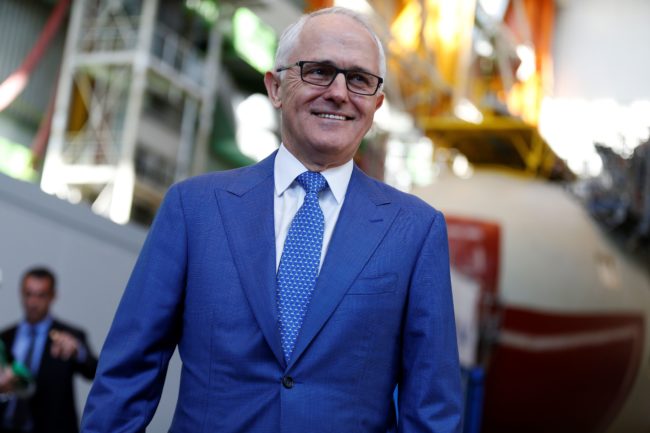Australia’s postal vote on equal marriage will not go ahead before legal challenge

The Australian government has agreed not to push ahead with a postal vote on equal marriage before a legal challenge is heard.
Mr Turnbull has given the green light to an informal ‘postal vote’ of Australians on whether to allow same-sex couples to marry, which will be advisory and non-binding in nature.
In a bid to circumvent Parliament, the vote will be carried out by the Australian Bureau of Statistics, which means it will be unregulated, and not subject to rules on misleading campaign materials that cover elections and plebiscites.

Australian Prime Minister Malcolm Turnbull (CHARLY TRIBALLEAU/AFP/Getty Images)
The plan already subject to legal action, with LGBT groups arguing that the government does not have the authority to carry out the postal ballot without the authorisation from Parliament.
At a preliminary hearing in the High Court today, the government agreed that it will not post out any papers in the same-sex postal vote before 12 September, to allow the case to be heard.
The case has been listed for an urgent hearing on 5-6 September, with further directions made by the Court for the filing of materials and submissions prior to the hearing.
The Public Interest Advocacy Centre (PIAC) is representing Andrew Wilkie, Member for Denison, PFLAG (Parents and Friends of Lesbians and Gays) and Felicity Marlowe, a mother in a same-sex relationship with three young children.
PIAC CEO Jonathon Hunyor said: “Our clients are seeking to stop the government proceeding with the postal vote on same sex marriage on the basis that the government does not have the power to conduct the postal vote without parliamentary approval.
“Our clients sought an urgent hearing by the High Court and an injunction to stop the postal vote going ahead before this case could be heard.
“The government agreed that nothing would be sent before the case is heard and the Court listed the case for an urgent hearing on 5-6 September,
“This is an important first step and we are pleased that the important constitutional issues raised by this case will now be considered urgently by the High Court.
“We look forward to making the case in full at a hearing in September.”
He said previously: “We will be arguing that by going ahead without the authorisation of parliament, the government is acting beyond its power.”
“We will argue that the government cannot validly undertake a postal vote and also that it cannot fund the exercise without parliamentary approval.”
“These are important issues about the way that power is exercised by governments and the role of parliament in our democracy.”
PFLAG National Spokesperson, Shelley Argent, said: “PFLAG is taking this case because the parents of LGBTI Australians don’t want to see our children subject to such a demeaning, hate-filled and pointless vote that will go nowhere and resolve nothing.”
Felicity Marlowe said: “I am worried about the impact the public campaign will have in my children, on my partner and all rainbow families across Australia.
“It will be a full-time occupation for the next three months for my partner and I to protect my children from the flyers delivered to our home stating that ‘children need a mother and a father – so vote no to marriage equality’, or to stop them seeing any billboards or posters in our local shopping centre or along the major roads we take to school every morning.”
Andrew Wilkie said: “I have consistently advocated against executive overreach of the kind we see with the postal vote on marriage equality. Parliament should decide if, when and how the people are consulted, and how it’s paid for.”

